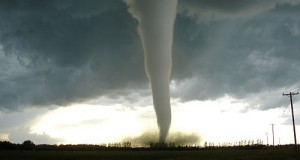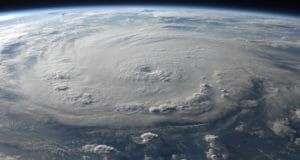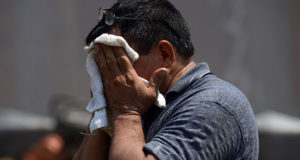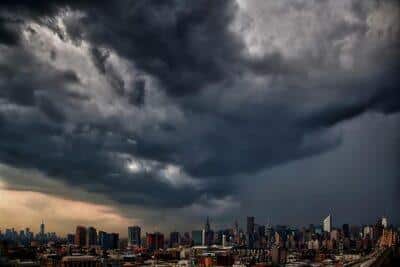
image credit NCSX.com
Are you prepped enough? Off The Grid News recently sat down with renowned survivalist Robert Henry to discuss preparedness tip and the myriad of issues going on in the United States which are causing great concern for off the grid, homesteading, and prepping families.
Robert is the creator of the Survival and Preparedness forum. He routinely teaches on a vast array of prepper topics, and offers survival insight via a shortwave radio show and podcast. Henry is also one of the featured speakers at the Life Changes Be Ready Preparedness and Gun show in Florida later this fall.
OTG: You have been actively preparing since 1986. What concerns prompted the increased desire to live a more self-reliant and sustainable lifestyle?
Robert: My earliest recollection of doing something survival related was when I was probably 8. We were living up north and the family was sitting around and the discussion of a nuclear war came up. We lived in a really cool old factory building that my Dad had converted to apartments. There was this room that the old factory used to pay their employees out of. The walls were all solid concrete and when we got the place, it had a huge vault door on it. We were dirt poor at the time, so my Dad promptly scrapped the door for cash.
So I guess either me or one of my brothers asked Dad what we would do in there was a nuclear war. He mentioned us all going in the “vault room.” So I walked in the vault room and looked at thought “man this is small and there is nothing in there.” I was the fat kid in the family so I figured it would be all of about 2 days before my brothers ate me to survive!! So not long after I started washing out spent milk jugs and filling them with water, pilfering a few cans of soup from the kitchen and stashing them in the vault room. Years later as a teenager I found American Survival Guide magazine in a grocery store. I realized there was a name for what I was- survivalist. I spent since then meeting like-minded people, learning what I could from them and on my own. I never really prepared out of “fear” of a certain event. Just kinda knew at a young age how I wanted to live and made it happen.
OTG: Since the late 90s, you and your family have lived full-time at your survival retreat. Please share what went into the decision to relocate both logistically and emotionally for you and your family.
Robert: I bought property in 1996 and started developing it. Even building the initial part of the house, I never really planned on living there full-time. Just figured I would continue to live in Florida and that would be my survival retreat and weekend getaway spot. Hurricane Floyd came towards North Florida in September of 1999 and it was forecast to hit Jacksonville dead on. Between closing up my shop and home for the hurricane, I had what I considered a late bug-out. What was usually a 3-hour drive became a 6-hour drive that it took some 9 hours or more. As I sat in a traffic jam in Georgia on US1 about 40 miles north of Jacksonville, I looked in the rearview mirror and thought to myself “wow, if there was a couple mushroom clouds over [Jacksonville] right now you’d be screwed!” That was my survival impetus to make the move full time. The other was financial and family related. Our industry took a drastic downturn in 2000 and it didn’t take a rocket scientist to see that coming. Continue to pay rent, electric bills and higher costs of living in the city or move to where I had no mortgage, no power bills and plenty of food and water? Yeah that choice was easy.
New Relocation Manual Helps Average Americans Get Out Of Harms Way Before The Coming Crisis
Emotionally, the change wasn’t too bad. Partially because the land was just a few hours from where we lived we went up regularly and to an extent gotten used to living like we do. I wouldn’t say the transition was seamless… but it wasn’t too terrible. One reason I recommend people buy retreat land within a few hours of home, if possible, is so that weekend work trips are more common and adapting to the new area is easier. Uprooting from Florida to move to say Montana would have been considerably more stressful and full of changes.
OTG: Urban preppers face far more obstacles than preparedness-focused families in rural, or even suburban locations. What advice would you give to city dwellers who consider themselves preppers and may be both contemplating a move or cannot move due to their careers?
Robert: Never say never, never say always. Never think you “have” to do something. Never be afraid of change- good change, I mean [chuckle]. Too often out of fear of the unknown, fear of being or acting different, fear of being the slightest bit inconvenienced we seek comfort. Death can be comfortable also- no more inconveniences there huh? So basically I’m talking in a circle about the idea that you just “have” to keep a certain job in the city.
What’s wrong with working for yourself? Back about 10 years ago now I told folks that had their houses drastically appreciate in value to take the ‘free money’ a.k.a. the equity that came from the rising prices, sell, move out of suburbia and buy a place for cash in a rural area. Many folks saw their home values go up one hundred thousand dollars or more with no effort of their own. More than a few cashed out, bought nice homes in the country with some land with the proceeds and never looked back. When the economy went in the toilet, those folks prospered, because they had little bills.
Even today, where there is a will, there is a way. Just don’t spazz out and try to do everything in a week, it won’t happen. Many newer preppers are always overwhelmed at the prospect of what all they need to learn, what all they need to acquire. I’ve always told folks you have time, but the question is what are you going to do with the time you have? Slow and steady does win the race, but the key word is steady, i.e, regular. I’ve never been rich, but we have no debt, several houses, acreage, three businesses and a ‘fair’ amount of preps. All of that came from slow but steady progress.
To the specifics of urban dwellers- realistically survival is a numbers game, always has been, always will be. If there are 500,000 people in your city, realistically maybe 1 percent are prepared. That leaves 495,000 people who will be competing with you for resources. And keep in mind they will view you as a ‘resource’ also. Clearly it makes sense to plan to be around less people when things start to happen. Less people=less problems.
Too often we look to halfway measures and fiction stories to give us quant but unworkable solutions that allow us to continue to live a comfy live in the suburbs and still try to believe we will be OK with those 495,000 starving pilgrims around us. Here is where all kinds of notions like “arming the people in my subdivision” come from. Seriously? Why don’t they have guns now? Don’t arm anyone you can’t feed and realistically you should never arm someone you don’t explicitly know and trust. “Bob” from down the block you wave to once in a while is not someone you truly know. Watch what the neighbors say every time a TV reporter is reporting on a dude that has heads in his freezer, or the crazy guy that held the girls captive in Ohio. Almost without exception the neighbors always come with the ‘old Mr. Jones was a nice guy that kept his lawn mowed well, we never knew he had heads in his freezer.’ Sorry for the sick illustration but the point is- You don’t really know your neighbors in suburbia to the level you need to know someone to survive with. And for all those that think I’m crazy, just go ahead and get a ‘community’ meeting going and make sure all of your neighbors store six months of food, that means all of them. If by some miracle you can make that happen, then you might have a snowball’s chance of making a neighborhood survival plan work in the post-apocalyptic world [PAW]. In short, city dwellers need to get with their like-minded country cousins to double up, or need to get out while they can.
Everything You Need To Know To Keep Your Home And Family Safe.
OTG: Did you homeschool your children? What were the benefits and hurdles involved when making the leap to the parent-led education process. How did your children adapt to the changes in socialization involved with homeschooling and living at the survival retreat?
Robert: We homeschool and have since our child was four. He’s known nothing else. Parents and other adults always comment on how polite he is, how smart he is and how he can relate and have ‘adult conversations’ with other adults. He gets a lot of socialization at various other church and sports-type activities and interacts with children of various ages well. We use a quality homeschool program that is accredited so we have to mail off his work and it gets graded by actual teachers so no one can think ‘of course his Mom gave him an A.’ Also, since it’s accredited, it will serve him well when he goes to college. We all love the flexibility of homeschooling and it fits our lifestyle well. Also it gives us control over what our child learns, versus what they are indoctrinated with in the public indoctrination system.
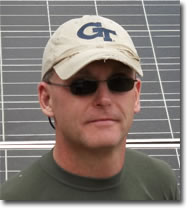 OTG: How important is shortwave (HAM) radio communication during both a survival and off grid living scenario? On average, how far can a user in a rural area (especially a hilly location) expect a signal to travel on handheld devices utilized by separated loved ones?
OTG: How important is shortwave (HAM) radio communication during both a survival and off grid living scenario? On average, how far can a user in a rural area (especially a hilly location) expect a signal to travel on handheld devices utilized by separated loved ones?
Robert: Well the important thing to remember is that comms can and often do fail. Just like other technology like solar power, night vision and thermal image detectors that survivalists use, we must be careful not to become too dependent on radios as they can fail as well.
As much as possible, things should be pre-arranged. For example, ‘Ted’ is part of your survival group and is making his way to your retreat post-crisis. If Ted’s radio dies and he cannot call in to say he’s a mile out, the group may not know he’s coming in and open fire on him. However if an SOP is arranged ahead of time so that Ted comes in a certain way, stops out away from the gate at a certain point, waves a certain colored bandana, flashes his lights a certain number of times, etc. well then that’s a no-tech type of way of being sure that Ted is indeed Ted. Likewise with rally points set up ahead of time and just the familiarity that comes with training and preparing with the same group of people for a lengthy period of time. The more that happens the less radio communications is needed.
That being said, having a way to, if nothing else, just listen to what’s going on is extremely important. For comms, I’d start with the most popular bands and start listening first. Definitely a good SW receiver with a beat frequency oscillator , a good CB, for listening to the general public, are important as well as short range comms for family/group use.
Harness the power of the sun when the power goes out…
OTG: What prompted your decision to create the extremely popular SurvivalandPreparedness prepper forum?
Robert: Something I should have done 10 years before we did get it started in 2010! Had several opportunities to start forums and even offers of free servers, etc. from folks that I passed up. We all go through different “seasons” in our lives and I think when we started it in 2010 it was the right ‘season’ to do it- although I still regret not starting it in 2000. As to the what prompted me- I am a member of numerous forums and many owners of other forums are good friends of mine but I always felt like I was “holding back” on other people’s forums from saying certain things I wanted to say. Unlike many out there, I’m not giving people the idea that they can continue in their comfy womfy suburban lifestyle if something bad happens. As a result of that, a lot of folks can’t tolerate my message. A lot of people want ‘easy answers’ now a days that are comfortable. Survival is work and those that want to survive better get used to that idea.
OTG: Is the threat of civil unrest one of your primary concerns? What preparedness tips can you offer to Off The Grid News readers concerned about personal safety in the days following either a man-made or natural disaster?
Robert: Keep a low profile now, keep your cards close to your chest. In other words, keep your mouth shut about your preps. You’re not going to change the word by proclaiming preparedness on the rooftop or the corner of your subdivision, you’re just going to expose yourself. There are ways to “spread the word” without endangering your family- learn them.
More to the point in personal safety, get the family involved. It shouldn’t be some of the ridiculous stuff you see on Doomsday preppers wherein they take kids way too young and way too irresponsible acting to the gun range, have them shoot five times and then the Dad makes this bogus pronouncement of ‘I’m confident Junior could help defend the family now.’ You shouldn’t because he’s not ready.
Too often with preppers we see this mindset that ‘I have a gun, therefore I’m safe.’ Yet the reality is that few have taken any professional gun training, fewer practice regularly to develop and maintain the skill sets necessary. Yes ammo is expensive but using it in training and practice is a necessary expense for those seeking true skill at arms. Stockpiling ammunition is important as well, but the goal should be skill at arms, not a safe full of weapons we aren’t really familiar with and tons of ammo we will never shoot. Too often, those types will simply be resupply points for gangs and others that are familiar with violence and won’t hesitate.
Further, preppers need to get themselves out of the comfort box and work on some practical hand to hand work. Systema, Brazilian Jui Jitsu, Muay Thai and Krav Maga are some good places to start. Also, don’t forget to add in CQB weapons work; knife, pistol, long arm and disarms. In Lakeland at the Expo in November I’m teaching a class on Simple Weapons Disarms. It is always an eye opener to see people who conceal carry realize just how easy it is for someone to take their weapon from them.
OTG: Our overly taxed, vulnerable, and antiquated power grid is a major concern for many preppers. What preparedness tips can you offer to folks worried about a downed power grid due to a solar flare, EMP attack, or cyber hackers?
Robert: In general preppers have a funny relationship with technology. One camp says no we don’t need it at all, just get me a bowdrill and some snares and I’m good to go. Another camp wants to skip the necessary skill development and get right into technology that they believe will enhance their capabilities. Good equipment like ACOG rifle sights, Night Vision devices like the PVS14, etc. will enhance the skills you already have, but will rarely take a novice and make them an expert.
We need to seek a balance on the technology issue. We must learn the skills necessary that do not require use of technology but where we can, we should use technology as labor and time savers. Learn to work without technology and develop your skills around that. We have quality night vision and thermal but we first learned to operate at night without these things. Ditto with anything else. Learn to live without it first before getting too dependent on it.
OTG: Medical preps are perhaps one of the most difficult aspects of living off the grid. How have you tackled the problem of both responding to both mundane and life-threatening?
Robert: We stay in decent health, eat pretty good food and exercise regularly both working around the homestead as well as running, working out and fight class. Minor things we treat at home and we rarely go to the doc for anything. A good network of friends in the medical industry has helped as well as a lot of extra circular medical training. We’ve put in fillings for teeth at home, set minor breaks, worked on larger cuts as well as everyday stuff like chicken pox, colds, etc.
In my opinion, people should start weaning themselves off of unnecessary meds as soon as possible. Lose excess weight and start exercising regularly. A lot of stuff will work itself out at that point and your body and mind will be in a better “place” for if something major ever does happen. I stunned a physical therapist after having surgery a few years back with an extremely quick recovery time that was due largely to good health, good flexibility and high metabolism. So there are plenty of benefits outside of if something ever does happen.
OTG: There are approximately three million prepping families in the United States, according to the latest polls. Why do you feel the ranks of preparedness-minded Americans has grown significantly in recent years?
Robert: If you had to place it on one word, I’d say money. When money got tight and the economy went to Helena Handbasket’s house, then more people got interested. Unfortunately few ‘made hay while the sun was shining’ i.e, prepped during good times. It’s hard for the general public to put away the excess corn during the seven years of plenty. Instead they wanted to eat double portions during those 7 years of plenty and put nothing back for the 7 years of famine. Now, many are in the seven years of famine and are complaining that there is no corn. The reality for many is the corn was there, but they ate double portions during the plenty and put little or none back.
So while it’s nice to see more people preparing, it would have been nicer and easier for them if they had started preparing before the economy went south. Too often now preparedness is simply given lip service in the movement. People use ‘lack of money’ as an excuse to not truly prep or to cut corners but continue on with bad and costly habits like smoking, buying lottery tickets, beer, paying $100 a month for cable TV. All these things are working against their survival and also financially keeping many from doing what they need to do. Not suggesting people need to live in a cave and just prep, but often times the ones crying the loudest about having no means of doing it are the ones that could easily cut out smoking, drinking, buying lotto and cable TV and soon be better prepared and have better health. Yet Americans always seek comfort and convenience over security and safety. Serious survivalists have to move past that and make the choices of security and safety first. When we do that, you find that comfort usually does follow as well.
 Off The Grid News Better Ideas For Off The Grid Living
Off The Grid News Better Ideas For Off The Grid Living


